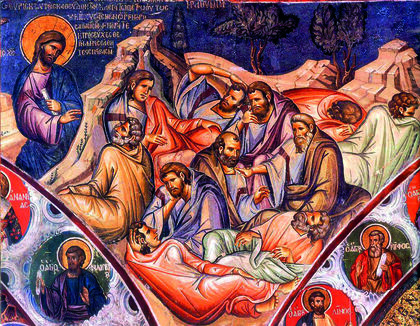 The Sunday of Adam’s Expulsion from Heaven is an opportunity of repentance. After the fall, as Saint Maximus the Confessor says, people fell ill from ignorance of the cause of sin and, in general, of reality. Although, paradoxically, even though Adam made a mistake, and we as people all make mistakes following him, it is very difficult for us to come to repentance. It’s paradoxical; the more sins a person commits, the harder it is for him to repent. We would say it should be the other way around, but, paradoxically, it is not. Repentance is not natural to Adam, and we repeat the Adamic behavior. When Adam did wrong, he justified himself; he did not admit his fault. We all do that. Therefore, the Lord, knowing that there is no way to expect fruits of repentance from us, shows us another way. He comes and shows us how to repent. He behaves as a slave of God all the way to the cross (Philippians 2:8), and then He asks of us: “stay a bit here near me or imitate my actions a bit.” As he asked the apostles in the garden of Gethsemane: “My soul is exceedingly sorrowful, even to death. Stay here and watch with Me.” (cf. Matthew 26:38). This is what the God-Man asks of us.
The Sunday of Adam’s Expulsion from Heaven is an opportunity of repentance. After the fall, as Saint Maximus the Confessor says, people fell ill from ignorance of the cause of sin and, in general, of reality. Although, paradoxically, even though Adam made a mistake, and we as people all make mistakes following him, it is very difficult for us to come to repentance. It’s paradoxical; the more sins a person commits, the harder it is for him to repent. We would say it should be the other way around, but, paradoxically, it is not. Repentance is not natural to Adam, and we repeat the Adamic behavior. When Adam did wrong, he justified himself; he did not admit his fault. We all do that. Therefore, the Lord, knowing that there is no way to expect fruits of repentance from us, shows us another way. He comes and shows us how to repent. He behaves as a slave of God all the way to the cross (Philippians 2:8), and then He asks of us: “stay a bit here near me or imitate my actions a bit.” As he asked the apostles in the garden of Gethsemane: “My soul is exceedingly sorrowful, even to death. Stay here and watch with Me.” (cf. Matthew 26:38). This is what the God-Man asks of us.
Therefore, this is the strategy He found to bring us back to Him: He comes, and then He goes down, down to the Cross, repenting for us, and then He asks us, “come and help Me a bit.” Although it is for us that He is there.
In practice, we notice that repentance is a bit distant, foreign to us, even though we are sinners. This is because sin comes with insensibility. It blinds us, as I said, we are sick with ignorance, we don’t know what has happened to us, how sick we are. The Lord on the Cross shows us how sick we are. We would not have known.
Therefore, since we cannot bring the repentance that we need to bring, He appeals to our mercy: “For My sake, come with Me, do not leave Me alone… Do this for Me….” And as such, we learn repentance. And as such, man wins. Even if the evil one blocks the way to repentance, mercy and love are available to every sinner and that is why the Lord appeals to those qualities.
We could learn from the good thief on the cross. Although he started like the other; that is, like the man who sinned and then suffers a whole life and doesn’t know why he suffers and is also bitter, frustrated, grumbling, however everyone deals with their suffering. But then, he sees Christ in their midst, who behaves differently. He was neither frowning, nor outraged, nor grumbling, even though He suffered more than them, He was more disfigured than the two of them. Yet, there was nothing similar between them standing on the cross. And that converted him. The thief realized that He, Christ, was something else. Then he came to himself and said those words to Him. He realizes in the first place that what he suffers is his own fault, as we should also realize, and that that Man suffers more than they do. Two great truths that we too must understand and help ourselves. And it shows the fact that the Lord suffers more than us; unjustly. That should also be in the fasting. The Lord suffered more than my total fasting or whatever I am doing in fasting. And this should be the spirit in which we dwell, for it is life-giving.
After this robber recognizes the Lord, no one takes away his suffering, he remains on the cross, but after that he stood straighter on the cross, better. He realized what dignity he can have as a man. He stood up on his cross, so to speak. Likewise, should we. We learn from Christ how to experience suffering in this life. And He gives us the best reason to do it: for His sake! “Take whatever weight comes in life and bear it for Me, please.” This is how we cut off evil. And the Lord did all this. He abolished all justice, and He took all the blame on Himself. “Do the same, please.” This saves us from all evil. This is our way out of the bondage of sin.
